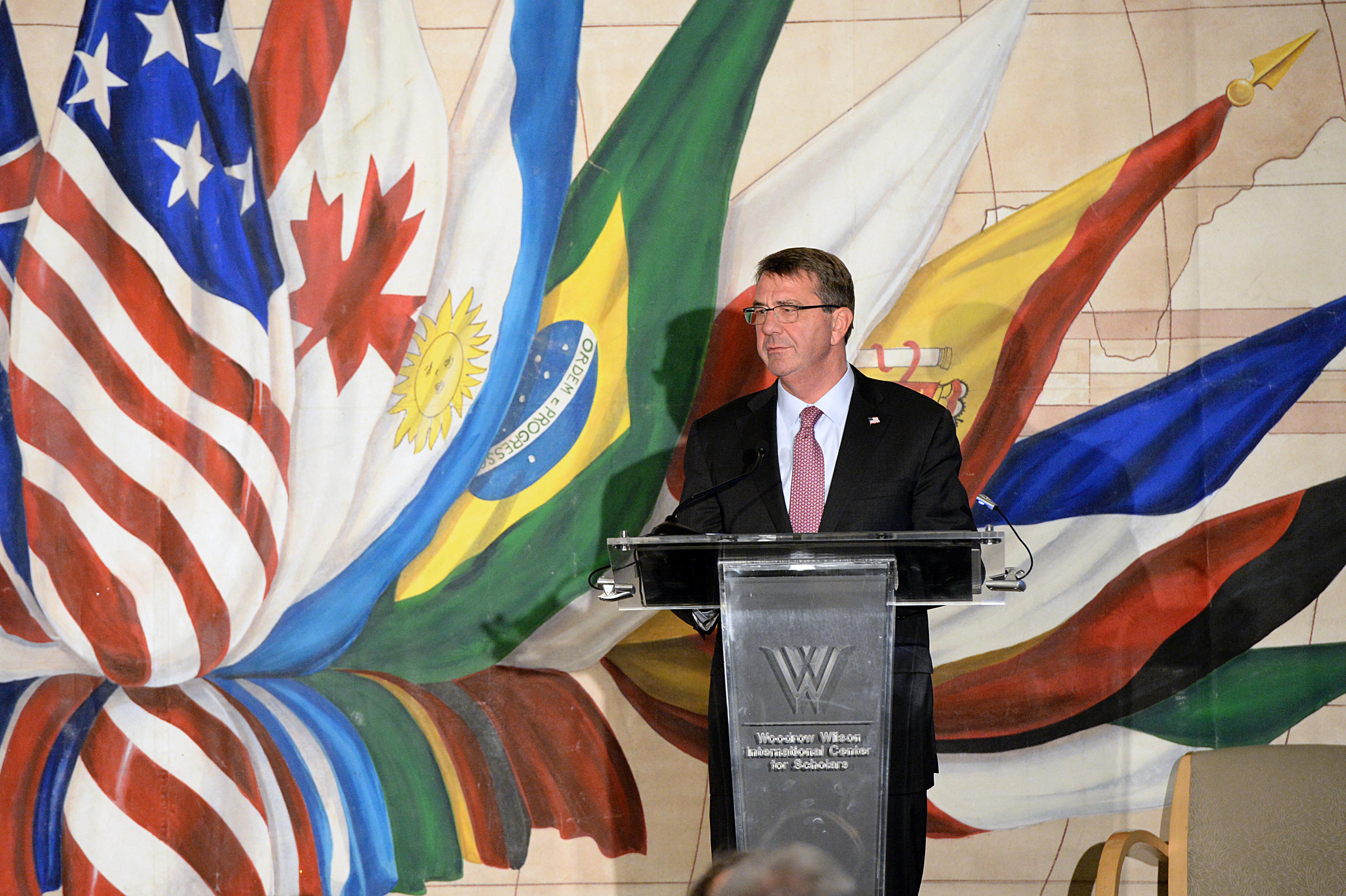By Terri Moon Cronk DoD News, Defense Media Activity
WASHINGTON, October 30, 2015 — Defense Secretary Ash Carter
was honored with the Woodrow Wilson Award for Public Service by the Woodrow
Wilson International Center for Scholars here last night.
The event also featured tributes to the secretary from the
Wilson Center and key industry leaders.
Carter noted that the Wilson Center was created to honor the
24th president by connecting policymakers with “actionable ideas” to make the
United States “fit and safe,” and that the concept continues today in security
and prosperity gains for the nation and around the world.
“That’s why we stand up for freedom of the seas around the
world, whether in the South China Sea or the Persian Gulf or the Arctic,” he
said. “That’s why we’re gaining momentum to defeat [Islamic State of Iraq and
the Levant] barbarism in the Middle East. That’s why we are working to pass the
Trans-Pacific Partnership, one of the largest trade agreements in history, and
a similar trans-Atlantic pact.”
“Unfortunately, more and more, some are intent on eroding
those values,” Carter continued. “Today, the rules-based international order
faces challenges from Russia, terror elements, and in a very different way,
China.”
Meeting those challenges requires the right strategies, he
said, by using the nation’s history lessons, knowing which mix of foreign
policy tools are best suited for any situation, and staying focused on U.S.
interests. “They are our North Star in the Asia-Pacific, in Europe, and in the
Middle East,” he said.
Asia-Pacific Rebalance
DoD is working on the next phase of U.S. rebalance to the
Asia-Pacific region by deepening long-standing alliances and partnerships with
South Korea, Japan, Australia and India, said Carter, who leaves today for a
visit to the region. “The rebalance will diversify America’s force posture, and
make new investments in “key capabilities and platforms, and building new
partnerships with countries like Singapore and Vietnam.”
Because the Asia-Pacific is a maritime region, Carter said,
he will focus on finalizing the Southeast Asia Maritime Security Initiative to
build greater regional capacity to address maritime challenges, and continue
maritime exercises such as the Southeast Asia Cooperation and Training
exercise, which involves six Association of Southeast Asian Nations countries.
“Many nations in the Asia-Pacific want to work with us, and
we want to work with them too,” the secretary said.
Protecting Domains for U.S., Other Nations
“We're also taking a stand for freedom of navigation, one of
the rules and customs that have helped so many nations in the region rise,”
Carter said. “We're making it clear the United States continues to favor
peaceful resolutions to ongoing disputes, and that we will continue to fly,
sail, and operate whenever and wherever international law allows,” he said.
“The South China Sea is not, and will not be an exception.”
Free, fair, and open access to shared domains also apply to
air, space and cyberspace, so all nations can rise and prosper, Carter said,
adding that DoD will continue to defend its networks from intruders and to
defend the nation from cyberattacks of significant consequence and seek to
deter malicious cyber activity.
Challenges from Russia, ISIL
The nation and its allies continue to deter Russia’s
“destabilizing influence, coercion, and aggression,” which threaten the peace,
stability and rules-based order, he said. A new playbook includes helping to
strengthen NATO’s new Very High Readiness Joint Task Force, and supporting
Ukraine with security assistance and training, he said.
“We're working to help facilitate training and exercises,
and make our forces more agile, mobile and responsive,” Carter said, noting
that the United States is supporting NATO's Cyber Defense Center of Excellence
to help nations develop cyber strategies, critical infrastructure protection
plans, and cyber defense posture assessments.
Degrading, Defeating ISIL
Turning to the U.S. strategy in the Middle East, the
secretary emphasized that ISIL forces will be degraded and defeated by the
global coalition of 65 nations.
Coalition airstrikes are hampering ISIL's movement and
operations and are systematically targeted the terrorist group's leadership,
Carter said. “The United States and coalition partners can enable [Iraqi and
Syrian opposition forces], but not substitute for them,” he added. “They’re the
only path to ISIL’s lasting defeat.”
The campaign to defeat ISIL is gaining momentum by focusing
on taking back Raqqa, ISIL’s stronghold in Syria, and Ramadi, Iraq, the
secretary said. The United States also will help to support more raids to
signal that “we won’t hold back from supporting capable partners in
opportunistic attacks against ISIL, or conducting such missions directly as we
did last week, whether by strikes from the air or direct action on the ground,”
Carter told the audience.
Preparing for Uncertainty
A new regional, networked approach to countering terrorism
and violent extremism will be use infrastructure already established in
Afghanistan, the Levant, East Africa and Southern Europe, where local forces
will provide forward presence and allow DoD to enable partners to respond to
many challenges, he said.
DoD will stay ahead of such challenges by making aggressive
investments in innovation with Silicon Valley partners, he added.
Another U.S. strength lies in its “unrivaled network” of
longstanding, allied partners around the world, which exists because the U.S.
military is “so capable … because our antagonists and competitors push many
states toward us ... and because our troops are great partners [who] perform
and conduct themselves admirably,” the secretary said. “They make us proud.”







No comments:
Post a Comment